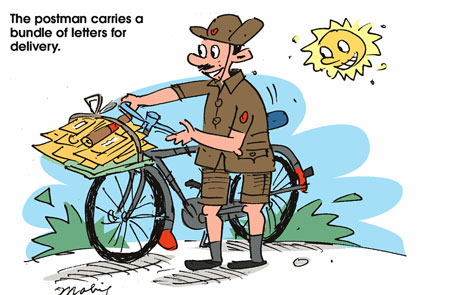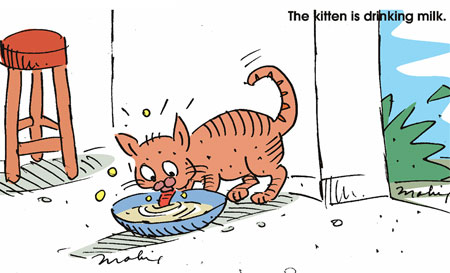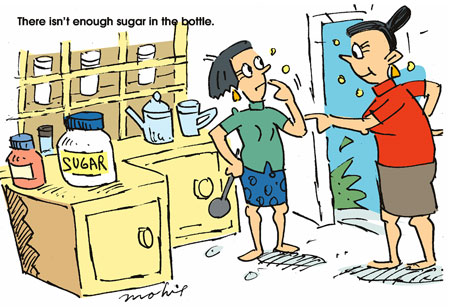|

by R. S. Karunaratne
Verbs with 's' and 'ing' endings
We use the base form of a verb with the 's' ending in the simple
present tense.
(a) When the subject is singular.
Brian drives his car every morning.

Brenda cooks for her family.
He visits his parents once a week.
She writes an essay every week.
Tommy wags its tail when I come home.
(b) When the subject is an uncountable or collective noun.
Water flows into the sea.
Sugar tastes sweet.
Money burns a hole in his pocket.
The new law comes into force from next month.
Unrest spills over into areas outside the city.
(c) Verbs ending in 'y' often take the 'ies' ending.
Shanthi worries about her future.
Father hurries home after work.
The postman carries a bundle of letters for delivery.
The court levies heavy fines on mosquito breeders.
He always tries to help his friends.
(d) Verbs ending in 'ch', 'o', 'sh', 'ss', 'x' and 'zz' often take
the 'es' ending.
The soldier marches to the camp.
The child goes to school.
Mother wishes me good luck every morning.
The express train passes the Panadura station without stopping.
The Urban Council taxes our property.
She buzzes around the kitchen making preparations for the party.
(e) An uncountable noun always takes a singular verb form even if it
ends in 's'.
Mathematics is not my favourite subject.
The news is true.
Politics is an interesting game for some people.
(f) A collective noun refers to a group of people or things.
We use a singular verb to refer to the group as a unit.
We use a plural verb to show that the focus is on the members that make
up the group.
The committee is ready to announce its unanimous decision.
The committee are divided in their decision.
The cast is ready to perform.
The cast are late as usual.
(g) When the subject is a noun phrase, we look at the headword to
decide whether to use a singular or a plural verb.
Their willingness to work is praiseworthy.
Their resistance to change makes it impossible to work with them.
(h) We use the base form of a verb with 'ing' in the present, past
and future continuous or progressive tenses.
* Present continuous tense
Union members are distributing leaflets.
The kitten is drinking milk.
The dog is barking at the stranger.

The secretary is typing letters.
The author is writing a book.
*Past continuous tense
Sam was reading for his Master's degree during the last few weeks.
Politicians were making a lot of promises during the election.
Vendors were selling vegetables at exorbitant prices.
The fox was running after a hare.
Lionel was driving his car very fast.
* Future continuous tense
I'll be writing to you when I reach London.
Father will be contacting you in the evening.
The factory will be producing canned fish from next year.
She'll be meeting important people at the next week's conference.
The lawyer will be arguing the case this afternoon.
(i) We use the base form of a verb with the 'ing' ending after a noun
to describe or identify it.
I work for a company producing newspapers.
The factory producing plastic furniture belongs to a foreigner.
The students sitting in the class are my friends.
The people packing the goods work at the harbour.
Which words work together?
In English we say "strong wind" but "heavy rain."
It would be wrong to say "heavy wind" or "strong rain."
This is known as "collocation" meaning how the way words are combined
to produce natural sounding speech and writing.
Match the verbs in column "A" with the adverbs in column "B". Check
your answers with the key.
[Column A]
1. abandon
2. abolish
3. absorb
4. abuse
5. accelerate
6. accept
7. accommodate
8. accomplish
9. accord
10. accumulate
11. accuse
12. ache
13. acknowledge
14. act
15. adapt
16. add
17. address
18. adjourn
19. adjust
20. administer
21. admit
22. adopt
23. adore
24. advance
25. advertise
[Column B]
A. altogether
B. freely
C. completely
D. effectively
E. easily
F. fully
G. gradually
H. hastily
I. immediately
J. indefinitely
K. absolutely
L. legally
M. heavily
N. quickly
O. properly
P. physically
Q. quickly
R. terribly
S. smoothly
T. successfully
U. unjustly
V. reluctantly
W. willingly
X. well
Y. slightly
Key:
1. C
2. A
3. Q
4. P
5. S
6. W
7. E
8. T
9. F
10. G
11. U
12. R
13. V
14. I
15. X
16. H
17. O
18. J
19. Y
20. D
21. B
22. L
23. K
24. N
25. M
Starters:
'Enough' as a determiner, pronoun and adverb
'Enough' means 'as much as necessary'.
Is there enough ice-cream for everybody?
I have Rs. 250. That should be enough.

I know enough about computers.
He is tall enough to touch the ceiling.
You are not old enough to see this film.
'Enough' can be used to mean 'as much as or more than is wanted.'
She has got enough work to do at home.
Half an hour ride on this horse is quite enough!
Grandfather has already worked more than enough.
I have heard enough, stop talking!
The manager said, "I've had enough of your excuses."
We say 'enough is enough' when we want something to stop.
Enough is enough.
I don't wish to argue with you any more.
We say, "That's enough" to tell somebody to stop behaving badly.
That's enough Ranjan. Give the tennis ball to your sister, now.
When we use 'enough' with an adjective, it always goes directly after
the adjective.
Would you be good enough to pick that book for me?
I hope my instructions are clear enough.
'Enough' can be used with a noun.
There isn't enough sugar in the bottle.
The college doesn't have enough teachers.
Some people do not earn enough money.
Sometimes, 'enough' can be used without a noun.
There is some ice-cream, but not enough for everybody.
A: Would you like some more cake?
B: No, thanks, I've had enough.
You are always at your desk. You don't move around enough.
Certain adjectives are followed by 'enough'.
You aren't tall enough to pick that mango.
Is the radio loud enough for you?
I've worked here long enough. It's time to retire.
[Activity]
Complete the following sentences using appropriate words. Check your
answers with the key.
1. Is there enough .............. in your coffee?
2. Is the radio ............. enough for you?
3. Now you can do a job, you are ................ enough to do so.
4. I didn't have enough ................. to answer all the questions.
5. The house isn't ............. enough for a large family.
6. You're very weak. Don't you ............ enough?
7. If you don't do enough ................. you will fall ill.
8. If you aren't ............... enough, don't go to bed.
9. He has got enough .............. He can buy anything.
10. I am not a good runner because I don't .................. enough.
Key:
1. sugar
2. loud
3. big/old
4. time
5. big
6. eat
7. exercises
8. tired
9. money
10. practice
Making adjectives from nouns
It is useful to know how to build word families.
For a start, let's make adjectives from nouns.
Write the relevant adjective against each of the following nouns and
check your answers with the key.
[Nouns] [Adjectives]
1. Tiredness .................
2. Title .................
3. Touch .................
4. Tradition .................
5. Trick .................
6. Trouble .................
7. Trust .................
8. Truth .................
9. Twist .................
10. Type .................
11. Urgency .................
12. Usage .................
13. Value .................
14. Variety .................
15. Violence .................
16. War ................
17. Warmth .................
18. Watch .................
19. Water .................
20. Weakness .................
21. Week .................
22. Weight .................
23. West .................
24. Whiteness .................
25. Whole .................
26. Width .................
27. Wildness .................
28. Willingness .................
29. Winter .................
30. Wire .................
31. Woman .................
32. Wonder .................
33. Wood .................
34. Wool .................
35. Work .................
36. World .................
37. Worry .................
38. Worth .................
39. Writing .................
40. year .................
Key:
1. tired
2. titled
3. touchy
4. traditional
5. tricky
6. troublesome
7. trustworthy
8. true
9. twisted
10. typical
11. urgent
12. used
13. valuable
14. various
15. violent
16. warring
17. warm
18. watchful
19. watery
20. weak
21. weekly
22. weighty
23. western
24. white
25. wholesome
26. wide
27. wild
28. willing
29. wintry
30. wiry
31. womanly
32. wonderful
33. wooden
34. woolly
35. working
36. worldly
37. worried
38. worthy
39. written
40. yearly
Concluded |



